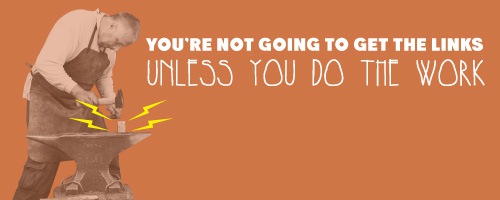
Lately I’ve had a thought burning in my mind – what’s the point of the title ‘SEO’. Obviously, it implies that we’re able to optimize sites for search engines, and (hopefully) gain clients’ sites visibility within search engines.
Right?
Why then, when we SEOs know Google still definitively uses links as a key metric for ranking, are we so afraid to touch them?
Shouldn’t this be a big concern for us? If we’re the professional optimizers, how can we not optimize such a key component? And yet, more and more, you see SEOs leaving behind the optimization portion and aim for more extended goals. Get traffic, build content, improve conversions, increase social, build brands.
Great goals, and certainly something that shouldn’t be ignored. But what happened to the optimization? Is it over? Is it dead? Or has search engine optimization, and link building especially, become harder?
I think there can be no doubt that as time has gone by Google has increasingly made it harder to build links. But building great links hasn’t gotten any harder. High quality, relevant, authoritative links have always been hard. Nothing new there – Google’s only yanked the rug out from under spammy link building tactics.
So is SEO itself worth still pursuing, or is it more important to focus on the marketing principles that more and more SEOs are flocking to?
Honestly, I don’t think the two should be mutually exclusive. I believe there’s a real need for both optimization and marketing. Things such as brand building, resource building, conversion optimization, and general marketing truly are important.
But true search engine optimization is just as vital for websites – and that most certainly includes pursuing link building.
Link earning versus link building
Links continue to drive conversation within the SEO world. Google’s crack down on spammy links has caused the expected ripple throughout the community – and now link building is often discussed as ‘link earning’.
But let me ask you a serious question, before I go on. Take a moment and truly think about it. What is the difference between ‘link earning’ and ‘link building’?
Have it in your mind?
Link building implies manual action. Someone is taking purposeful action in order to acquire a link.
Link earning implies a link that has been acquired by creating something worth sharing.
I can see why link earning has become a popular term – it’s what Google promotes, and helps a site doubly; a valuable, sharable resource has been created for the website that will now receive shares, which will probably go beyond just links. Meanwhile, manually building a single link often only results in just the link.
So link earning is great, in an ideal world. Unfortunately we live in the real world, and have to face reality (or the internet version of it).
The sad fact is that 99% of websites don’t have the audience engagement necessary to ‘earn links’. Hell, make that 99.99999%
Real link building has always been based upon added value, and then manually pursuing optimized links for that piece of added value, whether it takes the form of a resource, a guide, a video, or even a product (yes products can add value).
If you’re not working to optimize (eh hem, SEO) your content, including link building, then odds are you’re missing out on serious opportunities. Odds are, your content isn’t faring as well as it should. And in reality, you’re not much of a marketer, because you’re leaving real opportunities on the table. Opportunities that start with optimization via link building.
I mean, even content marketing has marketing in the title. And if you’re not acquiring links in your online marketing, you’re not working effectively.
Getting links takes work
Acquiring links takes work. This is twofold – first, creating something worthy of links, and second actually receiving the links.
First, an obligatory head nod to Rand’s “my publish button is my link building strategy” (that’s a paraphrase).
In reality, most websites don’t have any kind of following. And even if they do, it’s still hard to receive the links they should.
The SEO industry is probably one of the most equipped (and likely) industries to actually give editorial links.
Think about the process of acquiring a great link 100% naturally:
- Create something really great worth sharing
- Have a built up community that follows your content
- Have the relevant audience that your content resonates with
- Have a portion of that audience actually own websites
- Have a portion of the audience that own websites be in control and managing that site, actively
- Have a portion of the audience that owns and manages a site engaged enough to go to the effort of linking to your content
- A portion of those will link in a manner that will have a strong SEO impact
- Have a portion of the audience that owns and manages a site engaged enough to go to the effort of linking to your content
- Have a portion of the audience that own websites be in control and managing that site, actively
- Have a portion of that audience actually own websites
Pretty simple, huh?
Or you could do the work required to actually required to build quality links. Work naturally suited to content creation such as:
- Identify your target audience
- Recognize a need
- Clearly define the purpose and goals of your content/resource
- Create a target list of link/promotional opportunities
- Reach out to that list in a personable manner
- Follow up as needed
And, while you’re at it, you could attempt to build a relationship and foster community engagement.
Building a relationship doesn’t mean you need to become best friends or even chat every week with anyone who responds positively to your outreach. In reality, just make sure you’re engaging in the community of your peers and targeted audience. That’s all.
Do Links Still Matter?
It is my firm opinion that you’ll never get (build, earn, acquire, whatever you want to call it) links effectively without putting in the work.
There are, as always, a few exceptions to the rules. Websites that have managed to build a large cult following, and have a continually active and engaged audience. But for the average website—not to mention an ecommerce site—links don’t flow naturally.
So that leaves us with one question – do links still matter?
There can be no doubt they have in the past.
And, as Matt Cutts recently stated, links are still the best signal of authority and relevance Google has.
So to Google, they do. Should they to webmasters everywhere? Well, if those sites care about Google, I’d say it’s a safe bet.
Will social, authorship, citations, and the 200+ other signals Google has erode the effectiveness of links with time?
Perhaps, but it’s going to be quite a while before I would expect to see this be the case, and even then links will more than likely be a strong signal to Google.
Google is like the Titanic – they’re so large that even a slight course change can send waves through the entire web, not to mention the SEO community. But are they able to do a 180 degree turn with any speed? No.
Links are, and will continue to be, a very important factor into online visibility.
Links are after all the very foundation on which Google as a search engine was built.

